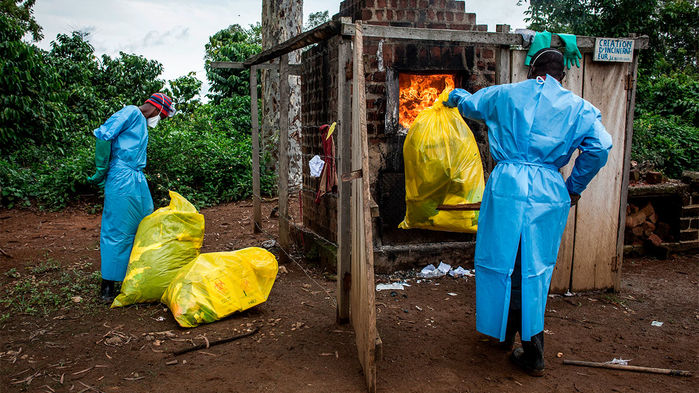The deadly outbreak of Ebola that’s been stubbornly defying containment efforts in the northeastern Democratic Republic of the Congo (DRC) for more than 2 months does not rise to what’s known as a Public Health Emergency of International Concern (PHEIC).
That’s the conclusion of an emergency committee convened by the World Health Organization (WHO) that has reviewed the outbreak.
The PHEIC designation hinges on the risk of the virus jumping borders, whether the outbreak is “extraordinary,” and whether an international response is necessary, says the panel’s chair, epidemiologist Robert Steffen of the University of Zurich in Switzerland, who spoke today at a press conference at WHO headquarters in Geneva, Switzerland. In theory, such a designation would help better coordinate and ramp up the response.
The DRC outbreak location borders both Uganda and Rwanda. Although there have been 220 documented cases (and 142 people have died) since the outbreak surfaced on 1 August, all of the cases have been in the DRC.
This is the 10th Ebola outbreak in the country, and the second this year. (The first ran from May through July in a different part of the country.) The current outbreak is occurring in an active conflict zone, Steffen noted, which has made containment harder and has threatened the lives of responders. The international response, he said, “is already taking place” and “many partner organizations since early August have already achieved a lot.”
Steffen said declaring a PHEIC “might hinder the efforts of the response teams and might have a negative implication for the whole action to control the outbreak.” WHO Director-General Tedros Adhanom Ghebreyesus says he accepts the committee’s recommendation and will ask it to reconvene if the situation changes.
Jeremy Farrar, who heads Wellcome Trust in London, issued a statement that a spokesperson said emphasizes the seriousness of the situation without questioning the committee’s conclusion. “Many of the elements are there to make this a public health emergency of international concern,” Farrar said. “Declaring this could have released more resources, including finance, health care workers, enhanced security and infrastructure—as well as more international political support.”
WHO sees things differently. “The support we’re getting from the international community is actually great,” Tedros said in response to a question on whether it would be harder to obtain international assistance without a PHEIC declaration.
A key complication of this response is that more than half of the newly identified infections do not have links to previous cases.
More than 18,000 people have received an experimental Ebola vaccine during this outbreak under what’s known as a ring vaccination strategy in which only those likely to come in contact with cases are inoculated. “We believe the vaccine is working,” Tedros said, but there has not yet been any formal evaluation. Uganda and Rwanda are studying the vaccine, Tedros says, “and we believe it will be approved as soon as possible.” (Another 75 people have received experimental drugs.) WHO epidemiologist Peter Salama, who heads a team of 250 responding to the outbreak, noted that the emergency committee discussed going beyond the ring vaccination strategy and using it across larger geographical areas to reach more of the population.
Steffen said the stepped-up response has “mitigated” the outbreak in one of the two affected provinces. “So we do have some optimism that this outbreak, just like the one in May, will be brought under control within reasonable time,” he said.
